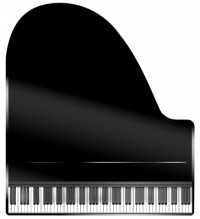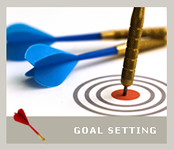
Coaching Clinic 14
Posted: 15.08.12 in Coaching Clinic Blog category
This month we look at how musicians can help dart players and we have a quick checkout practice game.
We look to musicians this month for some inspiration on practice and to see if they can help you to hit the big checkouts!
Musicians are good role models when it comes to practice. Like dart players they often practise solo, for hours and hours a week. One of my favourite quotes relating to practice is credited to a very famous musician, JS Bach. Brushing aside the praise lavished on him after playing a particular beautiful piece of music on the harpsichord, he said:
“There’s nothing remarkable about it at all. All one has to do is hit the right keys at the right time and the instrument plays itself”!
We can all relate to this modesty as darts fans when we watch a player hit a couple of trebles and then a double to take out a 140 check-out to win an important match. They do make it look simple, we all know it’s not.
The other similarity to the very best musicians and the very best dart players is that they all practise. That is the difference between the best and the rest. Forget all the nonsense about ‘natural talent’, that’s just not true! Practice, and most importantly the right kind of practice is the key.
To get you hitting the right notes on the practice board here is a checklist of ideas to get you started:
1. Work out what part of your game you need to practise. Fill out a session plan in advance and stick to it.
2. Set yourself some targets of what you are hoping to achieve from the session.
3. Put on your darts kit, shoes, shirt, watch, jewellery, everything you would normally wear.
4. Try to make the background noise in your practice game as realistic as possible. If you play in a noisy pub put some music on.
5. Try to plan your practice sessions when you know you will not be disturbed- it’s not always easy we know but it will help your concentration and focus.
6. Before you start your practice go through the warm up routine that you go through before a match. Do some stretches and start focusing your mind on what you are going to practise and what skills you may need.
7. Keep an accurate record of your practice scores. The feedback that players can create by doing this is extremely valuable.
Practice Game
Talking of 140 checkouts, how many darts would it take you to hit that on average? We only deal in 3 darts at the Darts Performance Centre. So, on average would it take you 3 darts, 6 darts or fewer, 9 darts or fewer, 12 etc etc to hit a 140?
Have five goes at it and five at these checkouts too:
120
100
121
80
First of all it is a nice quick game even for those struggling for practice time. Even 5 to 10 minutes a day practice will make a difference so don't ever think just because you only have limited opportunities to practise it is a waste of time.
Secondly predict how many darts you think you will need for each checkout and what, on average over the 10 throws your score might be? This is a great lesson in looking at your skills in a more objective way and getting an accurate idea of where exactly your skill level is.
Thirdly, once you have an average for each checkout you have a target to beat for next time. If you take your practice seriously, having a target to beat can add a little pressure to your practice if you are really determined to beat your score. Practising with a bit of pressure is the most valuable type of practice as it reflects more accuratley how you play in a competitive match.
Image: FreeDigitalPhotos.net
...............................................................................................................................................
The Darts Performance Centre is a resource to assist dart players of all standards play better darts. The site is arranged as an on-line coaching manual. There is advice on technique, nerves, psychology, goal setting, practice games, an area to log your statistics and an interactive area where your darting questions are answered by two sports scientists, one with 30 years dart playing experience! Membership is just £25.00 per annum
Post by Category
Posts by Month
- November 2025
- October 2025
- September 2025
- August 2025
- July 2025
- June 2025
- May 2025
- April 2025
- March 2025
- February 2025
- January 2025
- December 2024
- December 2024
- November 2024
- October 2024
- September 2024
- August 2024
- July 2024
- June 2024
- May 2024
- April 2024
- March 2024
- February 2024
- January 2024
- December 2023
- December 2023
- November 2023
- October 2023
- September 2023
- August 2023
- July 2023
- June 2023
- May 2023
- April 2023
- March 2023
- February 2023
- January 2023
- December 2022
- December 2022
- November 2022
- October 2022
- September 2022
- August 2022
- July 2022
- June 2022
- May 2022
- April 2022
- March 2022
- February 2022
- January 2022
- December 2021
- December 2021
- November 2021
- October 2021
- September 2021
- August 2021
- July 2021
- June 2021
- May 2021
- April 2021
- March 2021
- February 2021
- January 2021
- December 2020
- December 2020
- November 2020
- October 2020
- September 2020
- August 2020
- July 2020
- June 2020
- May 2020
- April 2020
- March 2020
- February 2020
- January 2020
- December 2019
- December 2019
- November 2019
- October 2019
- September 2019
- August 2019
- July 2019
- June 2019
- May 2019
- April 2019
- March 2019
- February 2019
- January 2019
- December 2018
- December 2018
- November 2018
- October 2018
- September 2018
- August 2018
- July 2018
- June 2018
- May 2018
- April 2018
- March 2018
- February 2018
- January 2018
- December 2017
- December 2017
- November 2017
- October 2017
- September 2017
- August 2017
- July 2017
- June 2017
- May 2017
- April 2017
- March 2017
- February 2017
- January 2017
- December 2016
- December 2016
- November 2016
- October 2016
- September 2016
- August 2016
- July 2016
- June 2016
- May 2016
- April 2016
- March 2016
- February 2016
- January 2016
- December 2015
- December 2015
- November 2015
- October 2015
- September 2015
- August 2015
- July 2015
- June 2015
- May 2015
- April 2015
- March 2015
- February 2015
- January 2015
- December 2014
- December 2014
- November 2014
- October 2014
- September 2014
- August 2014
- July 2014
- June 2014
- May 2014
- April 2014
- March 2014
- February 2014
- January 2014
- December 2013
- December 2013
- November 2013
- October 2013
- September 2013
- August 2013
- July 2013
- June 2013
- May 2013
- April 2013
- March 2013
- February 2013
- January 2013
- December 2012
- December 2012
- November 2012
- October 2012
- September 2012
- August 2012
- July 2012
- June 2012
- May 2012
- April 2012
- March 2012
- February 2012
- January 2012
- December 2011
- December 2011
- November 2011
- October 2011
- September 2011
- August 2011
- July 2011
- June 2011
- May 2011
- April 2011
- March 2011
- February 2011
- January 2011
- December 2010
- December 2010
- November 2010
Main Index








.jpg)

